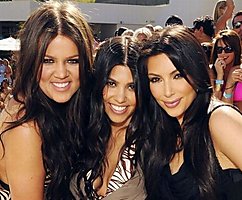5 ways to set the right goals and to achieve the desired
 Bashny.Net
Bashny.Net

© Andrew B. Myers
We realize not all of the goal — and often it's not laziness and weakness, and the inability to correctly formulate the task and define priorities. The publishing house "Mann, Ivanov and Farber", a book consultant, self-improvement, Robert Saipa on how to use scientific data about the brain to improve productivity and focus on implementing their ideas and desires.
Reduce the number of goals Record of 5-6 the most important goals you want to achieve in the next 90 days. Why so much? The main thing at this stage is to reduce: the period and the number of items in the list. Why? Purposes five or six, because as we already know, consciousness is not able to effectively cope with the information overload. It is easy to focus on multiple tasks. Of course, there is a time and a place for the so-called create the dreams when you get rid of all restrictions of thought and time and made a bold and crazy thoughts. This exercise is useful to expand the horizons and capabilities of his mind, but now we will focus on others. Take a calendar and determine the nearest reference point is approximately 90 days. Ideally, this is the end of the quarter, the end of the month too. If the endpoint will come in 80 or 100 days, that's okay; the main thing — to close to 90. Why is it important? Because approximately this time, the person may be very focused on one important goal, not pressing the "reset" button, and still see real progress.
No wonder almost every diet or exercise program for approximately 90 days. A great example of the extremely popular fitness program for home exercises P90X. "P" means "power" (power), and "X", "extreme" (Xtreme). In fact, just a marketing tool. But for the figure "90" there are serious scientific study. The program is not called P10X, because in 10 days great success will not reach, but not P300X: no one will find it hard to stick with the program without interruption. Why do you think wall street is given a value such quarterly financial statements of the companies?
Because it is for such a period may introduce significant changes without losing focus. In all important endeavors the time is much shorter than 90 days is too small to see real success, and much longer is too great to clearly see the finish line. Examine the next 90 days and put down on a piece of paper number from 1 to 6. You will write 5-6 key objectives that you wish to achieve in 90 days. Now consider all areas of their life: work, finances, physical health, mental/emotional state, family, participation in society — so that your list was comprehensive.
While you write down the most important goals for the next 90 days, we will repeat that what makes a goal effective. In the previous Chapter we examined in detail the five essential characteristics of your goals, and here I'll list them briefly.
1. What you write should be meaningful to you. These goals are yours and no one else, so be sure to secure what you really want to achieve.
2. What you write down must be specific and measurable. We're talking about the program for 90 days with a clear deadline, so that common phrases like "increase revenue", "lose weight" or "save money" is inappropriate. Clearly define what you intend to achieve during this period. How much money earn or save up? How many kilos to lose weight? How many miles to run? What are your sales (specific figures)? Your own figures or details are important, but the required specificity. Neglecting this step, you will miss most of the opportunities offered by the process.
3. Targets must be of a suitable scale, challenging, but achievable with your point of view. Remember: you have all about all about three months, and then have to sound a retreat. So choose your purpose a suitable scale. In this exercise, you will have to choose between the options "goal bolder to have to strain" and "more modest, just to be safe". The choice depends on your experience and previous success. If you're used to easily reach the main or are you a little bored, choose more daring goal. If you do it the first time, you should choose a modest goal.
4. Even if it is obvious, I'll emphasize: you need to fix in writing. You'd be doing themselves and me a disservice if you read all this and do nothing. I didn't say "think about what you want to achieve in the next 90 days," I said, "write it down". Assure that the coordinated work of eyes, hands and brain raises the choice and design of objectives at a qualitatively new level. So fix targets with a pen and paper and not just in the mind.
5. You will regularly review what now I write, so be honest with yourself and create goals that you will be interested to achieve. As soon as you lay the groundwork, we will develop a plan with the need to report and elements of programming, so keep in mind that you will interact with these targets.
Enough descriptions — it's time to work! Take a pen and paper and write down your 5-6 most important goals for the next 90-100 days. Take as much time as you need, and then go back to reading.
Identify key goal Now you need to determine which of these objectives your key. You may ask: "What is the key purpose?" And that's fine, because you probably have never considered their own goals. Your key goal is the serious pursuit of which supports the majority of your other goals. Looking at your short list, you'll notice that between the many objectives have connections; you might even realize that some are competing with each other. But I found that in almost all cases is one of the goals, the relentless pursuit of which, most likely, will help to achieve the desired results in all areas. I don't want to over-complicate. Perhaps you already know which of your goals fit this description.
Often, when the person reaches this stage, one of the goals recorded catches him in the eye and scream out, "Hey! Make me come true!" If you've already found that target, just mark it in the list and only then continue reading. If the key goal is not seen at once, that's okay too. I myself often had to figure out which of my key goals on which to focus efforts. You need the one with the highest probability will help achieve the others.
There are several options. Sometimes the key objective indirectly causes the implementation of the remaining, almost automatically. Is that a key goal requires the achievement of others in an intermediate stage or auxiliary tool. And sometimes the goal can affect your life, what you will gain strength, confidence and energy to defeat any wall to be faced. Here is an example. Recently, I began to understand what I want to achieve for the remaining 100 days of the year, and brought the following:
1. Personal sales.
2. Personal income.
3. To repay the debt.
4. Run 355 km and spend 35 strength training.
5. Meditate at least 50 times.
6. Take 14 vacation days without feeling guilty, disconnected from everything.
It was the most important goal. Please note that they are all specific and measurable. I knew that we need to combine them to one and to seriously address it. Strictly speaking, the correct answer is no; none of them was better or worse than the others. A decision on where the main efforts bring the greatest return, was completely at my discretion. Guess what goal I chose? Sale. The figure itself you wouldn't have said anything, but describe your reasoning. After completing the sales plan, I hereby would get revenue and ensure debt repayment. Achieving the goals would also allow me to find time to break away. And what is the connection with exercise and meditation? I knew that maintaining physical, mental and spiritual health will give me the energy needed. So all these goals are interlinked.
If the focus is on the key objective, the subconscious is actually taken for all of these objectives and the likelihood of achieving them increases significantly. You know? Your next step is to do the same with their goals: to determine which of them is the key to the rest. If you have not set it, choose slowly. Make sure you are confident in their key objectives, before we go any further.
Confirm the cause Now, when you have one goal, where you need to focus, it's time to answer the most important question: why? Why is it important to achieve it? The answer may intuition. Sometimes the stars are such that they come. You say to yourself, "I don't want no arguments. I've never felt this kind of enthusiasm, I want to fight!" If so, great! Just write your thoughts as a guide. If enlightenment did not happen, try to stimulate your thinking these questions:
— Why do I want to achieve this?
— What will I achieve this goal?
— What I feel, to bring this goal to life? Confidence? Delight? Peace? Inspired? Force?
— How achieving this goal will help me to become better or stronger? What do I need to grow?
— What else am I supposed to do with this result?
To the question "why" there are no wrong answers, and the more you have, the better.
Visualize goals To focus and "tune" your mind, you need to visualize the goal. So far, all your actions have been associated with the preparation of the plans. Even the majority does not reach this stage, considering your goals, so you already took the lead. But you can still do a lot to speed up the process. On the power of your subconscious mind billions of times greater than consciousness. It thinks and acts a lot differently. As we have said, one important key to the subconscious to understand that it operates images. The consciousness is controlling coherent, linear thoughts coming one after another (which even sound in your mind as proposals), and the subconscious mind, in fact, just see the picture and striving towards them.
Try this: let your brain will be something to see! Give him images to work. Sometimes I have to store images in a notebook or folder. Sometimes to create a dream Board and hang it in the workplace, to see all the images at once. Many of my clients post images of their goals on index cards with affirmations. There are many ways to visualize your goals. Experiment and select what is right for you.
Create supporting rituals You don't have to sing hymns or to sacrifice a lamb. To create a ritual, you deliberately build some automatic behaviors, which will be bound to your goals. It's not just invented by me welcome. Here are three books that proved to me his favor:
- James loer and Tony Schwartz "the power of full engagement"
- Robert Cooper, "don't disturb yourself"
- John Assaraf and Murray Smith "the Answer"
Track your morning activities for a few days, and maybe you will be surprise how one day is like another. So, you already have automatic behavior patterns; suggest some time to implement them consciously, and then replace with new. During the day there are two periods, when it will need to be done.
First — as soon as you Wake up in the morning. The first hour — or rather, the first few minutes — a good time to program your brain for success. At this time he moves from sleep to wakefulness, and his waves have such a configuration that your subconscious mind is exceptionally receptive to the "seed thoughts" that you sow. Have you ever noticed how the first few minutes after waking can set the tone for the day? Has it ever happened that you got up on the wrong foot? Be careful, and you will begin to see the practical connection between effective early in the morning and your results throughout the day.
Most take advantage of this opportunity: in the morning we feel nervous or on different occasions, or moving in a daze, not quite understanding what is happening. And many successful people purposefully use the beginning of the day to adjusting your mind to focus on their dreams and goals.
Second period when you need to be programmed, the last few minutes of your day. They are important largely for the same reasons that the first hour of waking: this is a transitional phase for the brain. In the last hour before bedtime, take the opportunity to reiterate in the form of images of your goals and some affirmations, and then Express gratitude for everything good that happened during the day.published
P. S. And remember, only by changing their consumption — together we change the world! ©
Source: theoryandpractice.ru
Tags
See also
25 facts about the happiness that we have learned in recent years
Adriana Kostetskaya. "I stopped myself to set goals. I catch a buzz from the process"
Idiotic advice on productivity, which do more harm to us than help
Elon Musk: the way of the future
We tend to associate happiness with consumption: why we bought, buy and will continue to buy
For the settlement of another planet need 40 thousand people
So who was the top scorer?

















